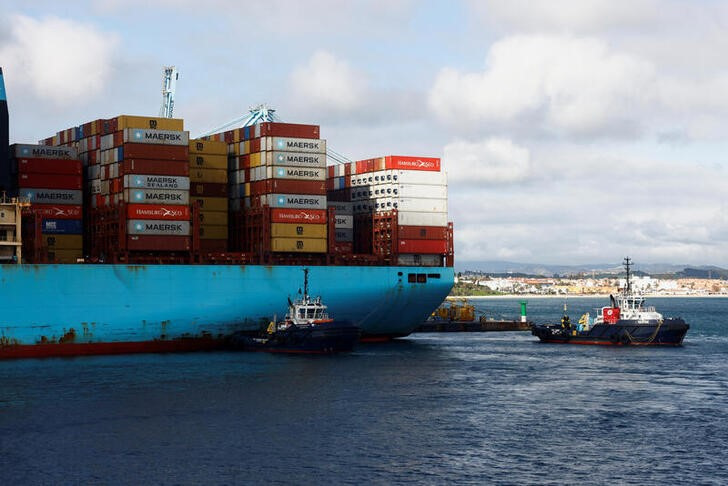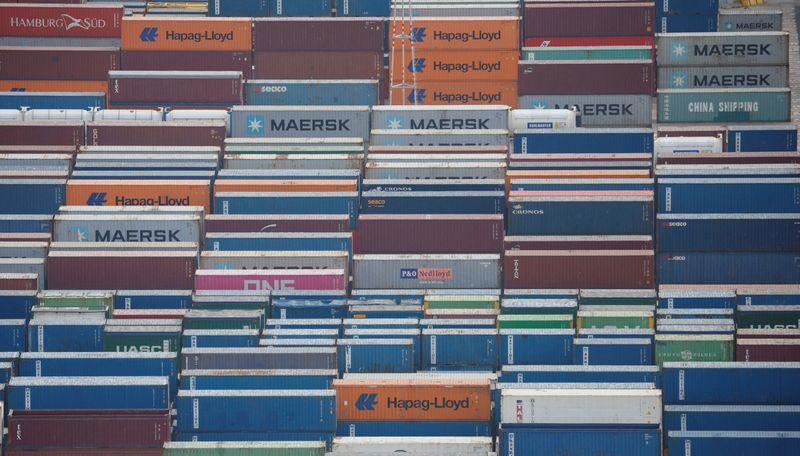By Mark John
(Reuters) - At a World Trade Organization event in September, former British prime minister Gordon Brown voiced out loud the fear that has quietly started to echo in the halls of power across Europe.
"Europe does not want to end up squeezed between America and China, either a Chinese colony or an American colony," he said of a scenario in which rivalry between China and the United States could lead to a world of two hostile power axes.
"For even if Europe would always choose America, upon whom its security depends, it also knows that its lifeblood, far more so than for the USA, is trade," added Brown, who since quitting UK politics has taken senior UN roles on global issues.
The fracturing of the rules and bonds tying the global economy together - so-called "geo-economic fragmentation" - seemed implausible only a few years ago. Now, it is a headline topic at the International Monetary Fund's annual meeting of economic leaders in the Moroccan city of Marrakech next week.
Nowhere is it more pressing than for Europe, whose wealth has always relied on trade, from its rapacious colonial history through to its reinvention as self-styled champion of WTO rules.
Together, the 27 countries of the European Union make up the world's biggest trade bloc, accounting for 16% of world imports and exports. That also makes them highly reliant on goods from elsewhere, ranging from critical raw materials to blood plasma.
But tariffs and other trade curbs are rising as governments seek to counter populist rivals who have snapped up the votes of those left behind by two decades of rapid globalisation including China's entry into the global trading system.
Both the United States and Europe have been hardening their stance towards Beijing while stressing the rules of world trade must be fairly applied. But Washington, some observers argue, is already testing how far those rules can be stretched.
"Europe's clear belief in holding to WTO principles in a world where the other two big powers don't really hold to them limits, in some ways, its opportunities for cooperation with the United States," Brad Setser, a trade veteran who has advised the Biden administration, told a Brussels audience last month.
One sign of that was the strain in talks on a U.S.-Europe "green steel" club erecting trade barriers to box out China. The main EU concern is that the U.S. proposals could break WTO rules by discriminating against third parties.
"BADLY PREPARED"
Back in 2020 there was a sigh of relief among most European governments when Joe Biden replaced Donald Trump as president. But they now recognise that any U.S. consensus for free trade has long gone and that they must adapt - preferably before a 2024 U.S. election that might return Trump to the White House.
"(European) firms need to be prepared for extreme scenarios in which the US forces them to leave China," warned a discussion paper presented to EU finance ministers last month entitled "Dealing with Europe's Economic (In-)security".
While such aggressive sanctions on China are not current U.S. policy, the EU paper seen by Reuters noted the bloc was "badly prepared for a world of geopolitical rivalry and great power competition" that could create such spillover effects.
Europe's leaders meet in Spain later this week to start sketching out an economic security plan to address the region's vulnerabilities, with a goal of reaching agreement by year-end.
It won't be easy.
On the one hand, countries must agree which technologies should be subject to stronger export controls and screening of outbound investments, in some cases weighing security interests against national commercial benefits.
On the other, EU capitals may have to stump up billions of euros of new money to help local industry develop in yet-to-be-confirmed strategic technologies.
They will do that in the knowledge that any measures could incur the ire of Beijing - with German China-focused exporters, for example, standing to lose more in such a case than others.
Wang Huiyao, president of the Beijing-based Center for China and Globalization think tank said Europe should factor in the longstanding cultural ties and commercial interests it has with China in formulating its policy.
"Of course the EU should approach China differently to how the U.S does," he said, arguing that differences on human rights and ideology could be worked through.
Ultimately, however, realpolitik might force Europe's hand.
An IMF analysis this year concluded that, if the world economy split into U.S.-centred and China-focused axes, Europe would fare best by remaining open to both, but noted it "might face heavy costs if such a policy approach significantly raises the possibility of barriers between itself and the U.S.".

Petra Sigmund, a German official who co-authored Berlin's China strategy, noted Europe and Washington did not always see eye-to-eye on China but told a recent think tank event the Biden administration showed "great willingness to sort it out".
"And we really hope ... that after the election in the United States this is going to continue."
